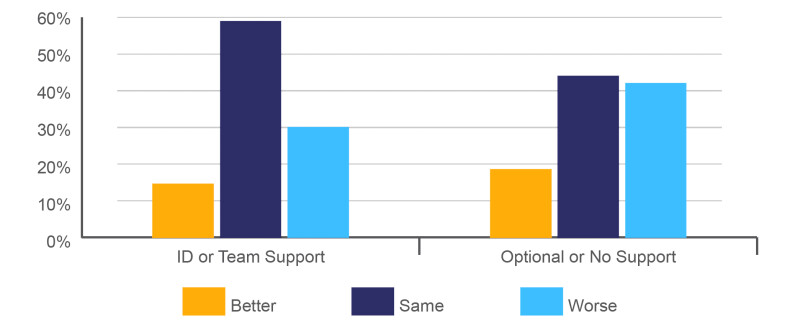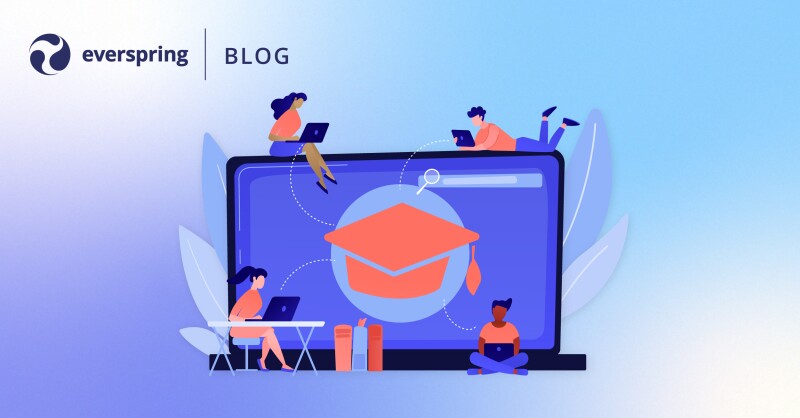The COVID-19 pandemic pushed courses online quickly and unexpectedly, but a gradual shift toward online and hybrid learning has been underway in higher education for some time. The number of postsecondary students enrolled in distance education courses increased substantially from 2012¹ to 2018,² and the Changing Landscape of Online Education (CHLOE) 4 report³ noted a significant rise in the prominence of the chief online officer role at universities in recent years, indicating that even before the pandemic, many university leaders recognized the need to enhance their institutions’ online infrastructure and resources.
Now the need for high-quality online programs is even more pronounced, and there is a new urgency for universities to move online in a thoughtful way that positions them to grow and expand their reach. Looking to online models will be crucial in coming years as universities face the impending demographic cliff⁴ and the anticipated drop in enrollments that will come with it. Additionally, due to the pandemic, all students and faculty have experienced online learning in some form or another, and many students report a desire to continue online or hybrid learning post-pandemic.⁵ Particularly for nontraditional and minority students,⁶ the flexibility of online learning can make higher education more accessible and affordable. All of this points to a clear answer to the question of how online and hybrid learning will factor into higher education going forward: It will, and universities who don’t evolve with quality will be left behind. To succeed, online education must be done strategically, using the best of what technology can enable.
Universities are navigating a new higher education landscape that is increasingly driven by online and hybrid options, but some remain skeptical of expanding online learning as a high-quality, viable option. Here, we’ll explore what this new landscape looks like and how institutions are adapting.
1. Online and hybrid courses and programs are no longer a “nice to have”—they’re a must have.
While COVID-19 necessitated a temporary move to online instruction, the future will demand online and hybrid options as a norm in higher education. Students increasingly seek more flexibility and choice in how, when, and where they learn, and the financial and opportunity cost of leaving a job and geographic place of residence to pursue a degree is a concern for many students. Online courses and programs make it easier for students to fit higher education into their existing lives and budgets, including while working or caring for family. Because of this, there is immense opportunity for online learning to make higher education more accessible to nontraditional students,⁷ minority groups and students with disabilities. Universities that lack this channel for educational delivery risk losing prospective students who would otherwise seek to attend.
What’s more, online education leverages technology in ways that can transcend traditional classroom settings. With rich multimedia learning experiences, simulations and gamified activities, faculty can work with instructional designers to make academic content come alive for students using evidence-based best practices in online pedagogy, thus leading to stronger student outcomes. As learning design technology becomes more advanced, students will increasingly expect engaging, effective digital learning to be a part of any course—even ones that are primarily face-to-face. As universities increasingly compete for the best students, they will be under rising pressure to deliver the best and most effective learning experience.
2. There is strong—and growing—demand for online continuing education and certificate programs.
Fluctuations in the economy and job market have prompted more workers to seek continuing education to upskill in their careers or pursue certificates and other credentialing programs that enable them to change course altogether, and to do so using formats that do not require that they disrupt their existing schedules. A Strada-Gallup Education Survey⁸ published in July 2021 reported that college graduates who pursue a non-degree credential on top of their degree rate their overall education substantially higher than degree holders without a non-degree credential. And for non-degree credential holders without a college degree, labor market outcomes are similar to those with an associate degree.
For universities, the growing popularity of non-degree programs presents an opportunity to create an ecosystem of lifelong learning that leverages online modalities to meet students where they are and serve them throughout their careers. Many schools are already building more alternative credential programs into their portfolios in creative ways. For example, the University of Notre Dame is working with Everspring to build a series of online data literacy courses specifically for professionals who work in development. And the University of Kansas School of Business offers a set of online stackable certificates that can function as stand-alone credentials or enable entry into the school’s online MBA—a structure that has opened pathways to admissions for many nontraditional and underserved students.
3. Online learning is not a compromise: Investment in high-quality instructional design and faculty development can yield outstanding online learning outcomes.
For online education to succeed, high-quality learning design and support for faculty are essential. According to the 2019 CHLOE 3 Report,⁹ which surveyed 280 colleges and universities across the US, student outcomes are better when online courses are developed with instructional design support.
Fig. 1: Online Student Performance vs. On-Ground Students With and Without Course Design Support⁹

Remote learning is not the same as effective online teaching. Across the spectrum of higher education, many students and faculty had dissatisfying experiences with remote learning after the sudden move to online in spring 2020—not because online education is inherently lower quality than on-ground education, but because the time, resources and know-how needed to design high-quality, engaging online courses were often not invested in redesigning face-to-face courses for effective delivery online. As demand for online and hybrid higher education grows, universities that are investing in the technology, instructional design expertise and faculty training and support needed for successful online programs will be ahead of the curve. Well-designed, well-planned online programs excel in the areas of enrollment, retention, on-time graduation, and student and faculty satisfaction—bringing a strong return on investment for the university. What does this involve?
- A robust and well-configured learning management system (LMS) that allows for a range of content delivery options and multimedia, is intuitive for students and faculty to use, and supports a data-driven iterative design process.
- Skilled instructional design based on best practices in online learning pedagogy and higher education course design.
- Faculty development and ongoing support that adequately prepares faculty to deliver online courses, supports them in bringing their expertise and academic content to life online, and provides technical assistance as needed.
- Student success and retention personnel and processes that guide students through their online program and support their changing needs, so that they thrive throughout their program to graduation.
4. Universities are increasingly partnering with third party providers to supplement their digital capabilities.
As universities focus more spending on technology infrastructure, online learning design and faculty development, they are increasingly turning to third party providers¹⁰ to help with these efforts. Higher education technology and services providers offer a range of support for universities in their digital transformations, such as:
- Online education platforms
- Course building software
- Learning management systems
- Technology to streamline enrollment and admissions
- Help to build, administer and grow online courses and programs
- Instructional design and online course development
- Faculty training and support for online teaching
- Marketing and enrollment expertise to reach a broader audience of prospective students
- Student services offerings that leverage technology and data to improve outcomes
Strategic partnerships with EdTech providers enable universities to implement much-needed technology, fill in the gaps where they lack existing resources, and—ideally—build their internal capabilities over time.
As online learning and the technologies that support it evolve, they are transforming the way education is delivered. In order to compete, universities need to establish well-rounded portfolios that provide high-quality, engaging online courses and programs in in-demand fields. Is your university prepared for the future of online education?
Everspring helps universities evolve as the market evolves. We partner with universities to build online programs and courses with quality, grow enrollments with the right students for those programs and plan for the future in a way that ensures the institution will thrive—regardless of the changes and challenges it may face. Learn how we can help your institution succeed online: send us a message to connect with our experts.
1. https://nces.ed.gov/pubs2014/2014023.pdf
2. https://nces.ed.gov/fastfacts/display.asp?id=80
3. https://www.qualitymatters.org/qa-resources/resource-center/articles-resources/CHLOE-4-report-2020
4. https://www.insidehighered.com/digital-learning/blogs/online-trending-now/second-demographic-cliff-adds-urgency-change
5. https://www.insidehighered.com/news/2021/04/27/survey-reveals-positive-outlook-online-instruction-post-pandemic
6. https://stradaeducation.org/press-release/americans-interest-in-online-and-hybrid-education-is-strong-regardless-of-covid-19/
7. https://pubsonline.informs.org/do/10.1287/orms.2020.06.11/full/
8. https://cci.stradaeducation.org/pv-release-july-28-2021/
9. https://www.qualitymatters.org/qa-resources/resource-center/articles-resources/CHLOE-3-report-2019
10. https://www.holoniq.com/notes/1377-university-partnerships.-opms-bootcamps-and-the-academic-ppp-acceleration./

